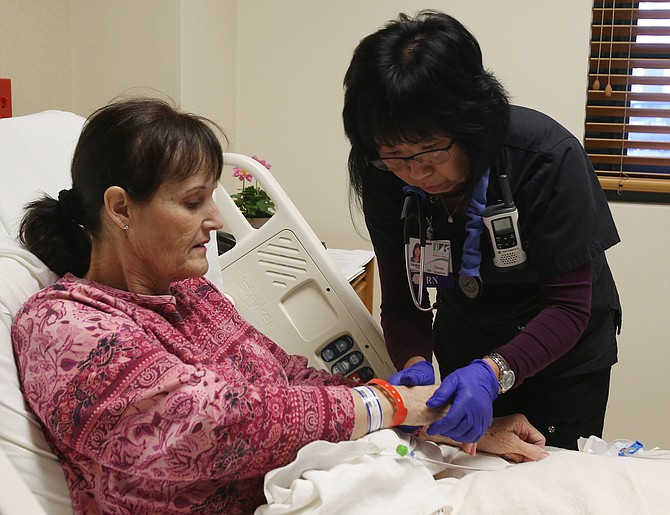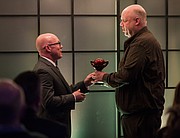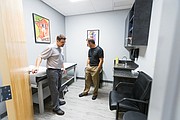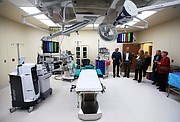Healthy competition one goal for Northwest Specialty Hospital

Registered nurse Teresa Gammond helps discontinue an IV for Dixie Brewer at Northwest Specialty Hospital.
Northwest Specialty Hospital CEO Rick Rasmussen envisions a future where providers in North Idaho can tend to all the region’s health care needs. He’s determined to participate in a future where people don’t go out of state for services. Like his counterpart at Kootenai Health, Rasmussen sees Kootenai County as a destination for medical tourism.
Rasmussen’s vision includes the success of all health care facilities in the region.
“I want Kootenai Health to be the best hospital in the area,” Rasmussen said, acknowledging the larger hospital at the center of Coeur d’Alene’s newly created urban renewal district.
Kootenai Health provides services that NWSH, based in Post Falls, simply does not. Kootenai has 299 beds, an emergency room, a neonatal intensive care unit, cardiologists and gynecologists.
“I want Kootenai to be the best hospital because it’s for our community,” Rasmussen said. “I think competition is a great thing. They raise the bar for us and we raise the bar for them. There’s not a monopoly, but healthy competition. Who benefits from that? The patients benefit in our community. The better health care we can provide, well, everybody benefits there.”
The Coeur d’Alene City Council approved a new Health Corridor urban renewal district Dec. 3, placing Kootenai Health at the center of revitalization efforts. Northwest Speciality Hospital, a privately owned, for-profit organization, was left wondering why they weren’t invited to the discussion table.
Dr. Michael Drager, chairman of the NWSH board of directors and one of the hospital’s founders, believes NWSH’s presence at that table would have been beneficial.
“Joint discussions first and then an urban renewal would have been to everyone’s benefit,” Drager said. “The hospitals need to work together for better efficiency, to lower costs, and to address duplicate services.”
“To be a top five or six employer in health care in our community, to be seeing 85,000 patients a year, and to not be invited to the discussions was disheartening,” said Rasmussen, his big hands falling in his lap.
Rasmussen was trained as an accountant and worked for many years in the timber industry. Born in Libby, Montana, he grew up in Coeur d’Alene. His father, “Big Daddy” Rasmussen, was a track coach and math teacher at Coeur d’Alene High School for 35 years.
“I try to walk in my dad’s footsteps,” Rasmussen said, chuckling. Even for him, those are big shoes to fill.
His dad took care of people, he built community, and guided children into the future. He also taught kids how to run. It’s no wonder Rasmussen uses sports analogies whenever he’s excited about something.
“I’m all for the concept of more health care in North Idaho,” Rasmussen said. “I don’t look at it that it needs to be a Kootenai play. It needs to be a North Idaho play. It should be about having health care more available in Kootenai County and not just about growing Kootenai Health.”
NWSH is one of the largest taxpayers in Post Falls. That money goes toward the community — to roads, schools, and the police. Urban renewal dollars ultimately come from taxpayers.
“To use taxpayer money would really be painful to me,” Rasmussen said. “[Kootenai Health] is a community hospital but they also make money and then use taxpayers’ money to grab more land and expand on that. As a community member — now this is Rick the community member, see I’m wearing that hat — that would give me heartburn.”
Rasmussen wears the hat of CEO, but has also worn the hat of a Kootenai County community member for over 50 years.
“A lot of what I’m able to do here [at NWSH] is combine those hats,” Rasmussen said. “I look at it as offering lower MRIs or a cheaper urgent care visit. We’re helping the community out. We want to be a part of the community. We take all insurances.”
Rasmussen believes medical costs should be transparent for all patients, but especially with Medicaid and Medicare costs. He said Medicare reimbursement is grossly inadequate. The government’s system doesn’t reward the lower cost facility, he said, instead heading the opposite direction: encouraging hospitals to spike prices.
With transparent costs and price ceilings, Rasmussen believes the government could incentivize all hospitals to lower their costs.
“I’m a big believer, and I know our owners are too, in letting people know truly what [a procedure] is going to cost them,” Rasmussen said. “Health care is expensive and it’s scary. You should be able to know what you’re getting into. There shouldn’t be the big vast differences — tens of thousands of dollars of difference — to have the same procedure done at another facility.”
For example, Northwest Specialty Hospital charges $775 plus an approximate $400 radiologist reading fee for a CT scan with and without contrast for chest, abdomen, and pelvis. Kootenai Health charges $7,191.58 plus a radiologist reading fee for the same procedure. The quoted Kootenai price includes a 20% discount given for procedures paid in full at time of service. Both prices were quoted for a patient without insurance over the phone by hospital staff.
“A couple of years ago we ranked 14th in the country out of all 5,000 hospitals,” Rasmussen said. “There are 27 different metrics. To be 14th in the country we are doing something right.”
NWSH is one of only 4% of hospitals in the United States that are physician owned. Northwest Doctors LLC — a collection of 22 providers including one Certified Registered Nurse Anesthetist and 21 MDs, surgeons, specialists, urgent care doctors, and family practice doctors — owns 52% of NWSH. Surgery Partners out of Nashville, Tennessee owns the remaining 48%.
The future of physician-owned hospitals has been under fire since a provision in section 6001 of the Affordable Care Act prevented them from expanding or adding new physician owners. Outside lobby groups likely encouraged the provision into the law, Rasmussen said.
The American Hospital Association and the Federation of American Hospitals recently wrote letters to federal lawmakers, opposing a congressional bill to lift restrictions on physician-owned hospitals under the ACA. Northwest Specialty Hospital was grandfathered in.
Northwest Doctors LLC entered into a tentative agreement with MultiCare Health Systems of Tacoma in September 2017. The agreement gives MultiCare the option of obtaining the majority ownership position at NWSH before Sept. 30, 2020.
“The MultiCare transition is far from being a done deal,” said Drager. “[MultiCare] has an option agreement with NWSH that will expire at the end of 2020. As of right now there really are no terms for that transition. The future appears similar whether MultiCare is involved or not...We will continue to grow service lines that are needed in the community.”
“It’s been great to be physician owned because providers, I think, have the best knowledge and input into giving the highest quality of care,” Rasmussen said. “They are very passionate because these are their patients.”
Phasing out the portion of the hospital that is physician owned provides an exit strategy for many of the owning providers as they near retirement. It would also allow the hospital to expand.
“MultiCare gives us the footprint to grow and expand without breaking the regulations that are unfair to physician owned hospitals,” Rasmussen said. “MultiCare has our same philosophy: Kindness is in their belief structure. That hits me at home because that is what we are about here.”
When Rasmussen stepped from his office into the waiting room at NWSH, he slowly made his way around the network of chairs, shaking patients’ hands. He used their first names and wondered how their son or daughter played in Friday’s game or how their parents were getting along. Not surprisingly, Rasmussen was awarded Citizen of the Year by the Coeur d’Alene Chamber of Commerce in October. He oversees the hospital much like doctors once welcomed patients into their home offices, with warmth and compassion.
“We want everybody to feel like they are somebody’s neighbor, cousin, brother, sister,” Rasmussen said. “You’re somebody’s family member when you come in here and we always want to remember that.”
Rasmussen teaches every new employee at NWSH the “5 and 10” rule: if an employee is within 5 to 10 feet of a patient or their family, they should engage that person, talk to them, show them where they are going. Rasmussen wants his staff to help patients navigate the often scary world of health care with compassion.
“[Rasmussen] has a huge heart,” Drager said. “He puts the community and the employees and the patients before himself. He is truly a role model.”
NWSH will see over 85,000 patients this year. When Rasmussen started working at the physician owned hospital in 2012, they saw 5,000 patients annually and employed 120 people. Now the hospital employs 430. They have 43 patient beds.
“I’m about people,” Rasmussen said. “I look at the surgery schedule every day and I usually know two or three people on there. I take that responsibility very seriously. I need to hire and find the best team possible. We’ve been fortunate enough to have won some awards. But you don’t do it for the awards. You do it because it’s the right thing for our patients and the right thing for our community.”
Rasmussen has partnered with the Coeur d’Alene Chamber of Commerce, Kootenai Technical Education Campus and North Idaho College to encourage young adults to prepare for well-paying jobs in North Idaho.
“I want my staff’s kids and their kids’ kids to work here,” he said.













